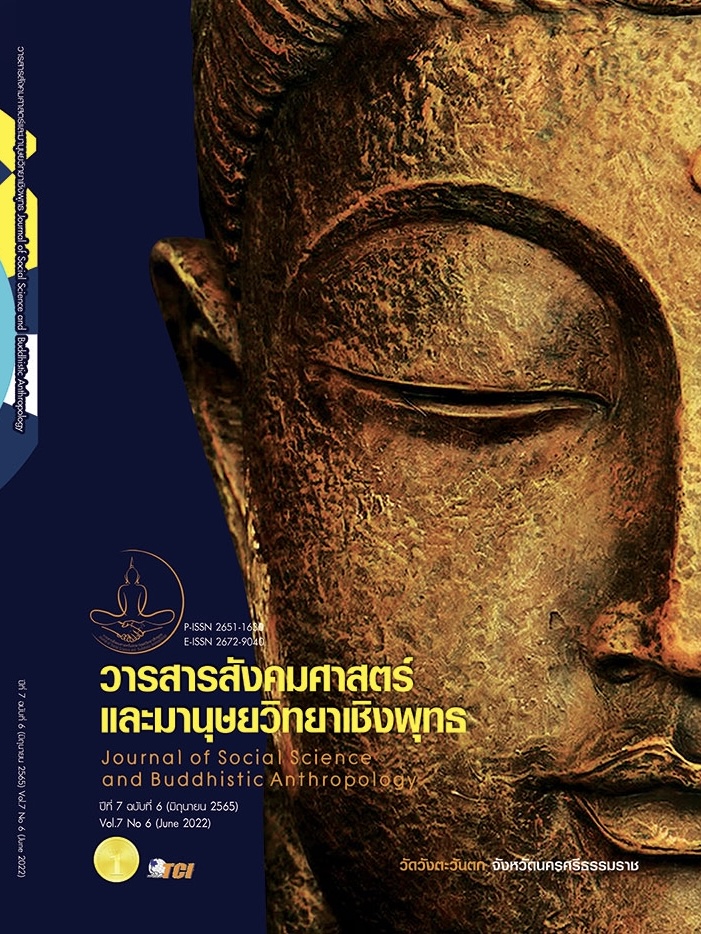THE DEVELOPMENT OF TRAINING CURRICULUM TO ENHANCE ACTIVE LEARNING MANAGEMENT COMPETENCY THROUGH COACHING AND MENTORING FOR PRIMARY TEACHERS
Keywords:
Training Curriculum, Active Learning Management, Coaching and MentoringAbstract
The objectives of this research article were to 1) Study the basic information for the training curriculum 2) Construct and examine the quality of training curriculum, 3) Implement training curriculum and 4) Evaluate training curriculum. The target group for research study consisted of 35 primary teachers in Nan Primary Service Area Office 2, who attended to participate in this study. The research instruments were: 1) the prototype of training curriculum 2) the appropriateness of training curriculum assessment 3) the Active Learning Management Competency assessment and 4) the training curriculum assessment. The statistics for analysis data were percentage, mean, standard deviation and t-test for Dependent Sample Group. The results were as follows: 1) The basic information for the training curriculum were the techniques to enhance the knowledge skill and attribute in active learning management competency through coaching and mentoring. The coach and mentor supported and guideline the teaching method. 2) The result of construct and examine the quality of training curriculum that there were 6 elements of curriculum 1) purpose 2) competency 3) structure and content 4) step of training 5) resources 6) The evaluation and assessment. The pilot study founded that teacher had active learning management competency higher than the criterion at 75 percentages 3) After to imply the training curriculum founded that the teachers had active learning management competency higher than the criterion at 75 percentages to a statistically significant degree (p<0.05). and 4) The result of the teachers' opinion though the training curriculum were at the high level.
References
จรูญ พานิชย์ผลินไชย. (2559). การศึกษาสมรรถนะการจัดการเรียนรู้ในศตวรรษที่ 21 ของนิสิตระดับปริญญาตรี คณะศึกษาศาสตร์ มหาวิทยาลัยนเรศวร. วารสารมนุษยศาสตร์และสังคมศาสตร์ (สทมส.), 22(2), 25-37.
ชาลินี เกษรพิกุล. (2555). การพัฒนาหลักสูตรฝึกอบรมเพื่อพัฒนาสมรรถนะครูภาษาไทย ด้านการสอนคิดวิเคราะห์. ใน ดุษฎีนิพนธ์ศึกษาศาสตรดุษฎีบัณฑิต สาขาวิชาบริหารการศึกษา. มหาวิทยาลัยศรีปทุม.
ทิศนา แขมณี. (2545). ศาสตร์การสอน: องค์ความรู้เพื่อการจัดกระบวนการเรียนรู้ที่มีประสิทธิภาพ. กรุงเทพมหานคร: บริษัทด่านสุทธาการพิมพ์.
ธารทิพย์ นรังศิยา. (2558). แนวทางการชี้แนะและการเป็นพี่เลี้ยงครู : บทเรียนจากการศึกษาเชิงปริมาณและเชิงคุณภาพ. ใน วิทยานิพนธ์ครุศาสตรมหาบัณฑิต สาขาวิชาวิธีวิทยาการวิจัยการศึกษา. จุฬาลงกรณ์มหาวิทยาลัย.
ประยูร บุญใช้. (2564). การพัฒนารูปแบบการเสริมสร้างสมรรถนะการจัดการเรียนรู้เพื่อพัฒนาผู้เรียนในศตวรรษที่ 21 สำหรับครูประถมศึกษา. วารสารพัฒนาการเรียนการสอน มหาวิทยาลัยรังสิต, 15(1), 118-137.
รุจิร์ ภู่สาระ. (2551). การพัฒนาหลักสูตร:ตามแนวปฏิรูปการศึกษา. (พิมพ์ครั้งที่ 3), กรุงเทพมหานคร: บุ๊คพอยท์.
วารินท์พร ฟันเฟื่องฟู. (2563). สมรรถนะการจัดการเรียนรู้เชิงรุกของนักศึกษาวิชาชีพครู. วารสารวไลยอลงกรณ์ปริทัศน์ (มนุษยศาสตร์และสังคมศาสตร์), 10(3), 193-202.
วิจารณ์ พานิช. (2555). วิถีสร้างการเรียนรู้เพื่อศิษย์ในศตวรรษที่ 21. กรุงเทพมหานคร: มูลนิธิสดศรี-สฤษดิ์วงศ์.
สมศักดิ์ จี้เพ็ชร์. (2562). การพัฒนาคุณภาพครูโดยการนิเทศแบบสอนแนะและการเป็นพี่เลี้ยง (Coaching and Mentoring)โรงเรียนมหาสวัสดิ์ (ราษฎรบำรุง). วารสารวิชาการ บัณฑิตวิทยาลัยสวนดุสิต, 15(2), 165-184.
สำนักงาน ก.ค.ศ. กระทรวงศึกษาธิการ. (2564). คู่มือการดำเนินการตามหลักเกณฑ์และวิธีการประเมินตำแหน่งและวิทยฐานะข้าราชการครูและบุคลากรทางการศึกษา ตำแหน่งครู. กรุงเทพมหานคร: กระทรวงศึกษาธิการ.
สำนักงานเขตพื้นที่การศึกษาประถมศึกษาน่านเขต 2. (2564). ศึกษาสภาพและปัญหาสมรรถนะการจัดการเรียนรู้เชิงรุก. น่าน: สำนักงานเขตพื้นที่การศึกษาประถมศึกษาน่านเขต 2.
สำนักงานคณะกรรมการการศึกษาขั้นพื้นฐาน. (2553). คู่มือการประเมินสมรรถนะครู. กรุงเทพมหานคร: กระทรวงศึกษาธิการ.
อภินันท์ สิริรัตนจิตต์ และนธี เหมมันต์. (2560). สมรรถนะในการจัดการเรียนการสอนที่เน้นผู้เรียนเป็นสำคัญ ของคณาจารย์ มหาวิทยาลัยหาดใหญ่. วารสารบรรณศาสตร์ มศว., 9(1), 45-56.
Garmston, R. (1987).“How Administrator Support Peer Coaching”. Educational Leadership, 44(5), 18-28.
Good, Carter V. (1973). Dictionary of education. (3rd ed.), New York: McGraw hill BookCompany.
Gordon, S.P. (2014). Professional development for school improvement : Empowering learning communities. Boston: Pearson.
Mink, et al. (1993). Developing high-performance people : The art of coaching. Reading. Massachusetts: Addison-Wesley.
Taba, H. (1962). Curriculum Development: Theory and Practice. New York: Harcourt, Brace and World, Inc.
Tyler, R. (1968). Basic Principles of Curriculum and Instruction. Chicago: The University of Chicago Press.
Ornstein, A. C. and Hunkins, F. P.(2014). Curriculum Foundations: Principles and Theory.6". Edinburgh Gate: Pearson.
Stufflebeam, D. L., & Shinkfield, A. J. (2007). Evaluation theory, models, and applications. (Chapter 19). San Francisco: Jossey-Bass.
Downloads
Published
How to Cite
Issue
Section
License
Copyright (c) 2022 Journal of Social Science and Buddhistic Anthropology

This work is licensed under a Creative Commons Attribution-NonCommercial-NoDerivatives 4.0 International License.









